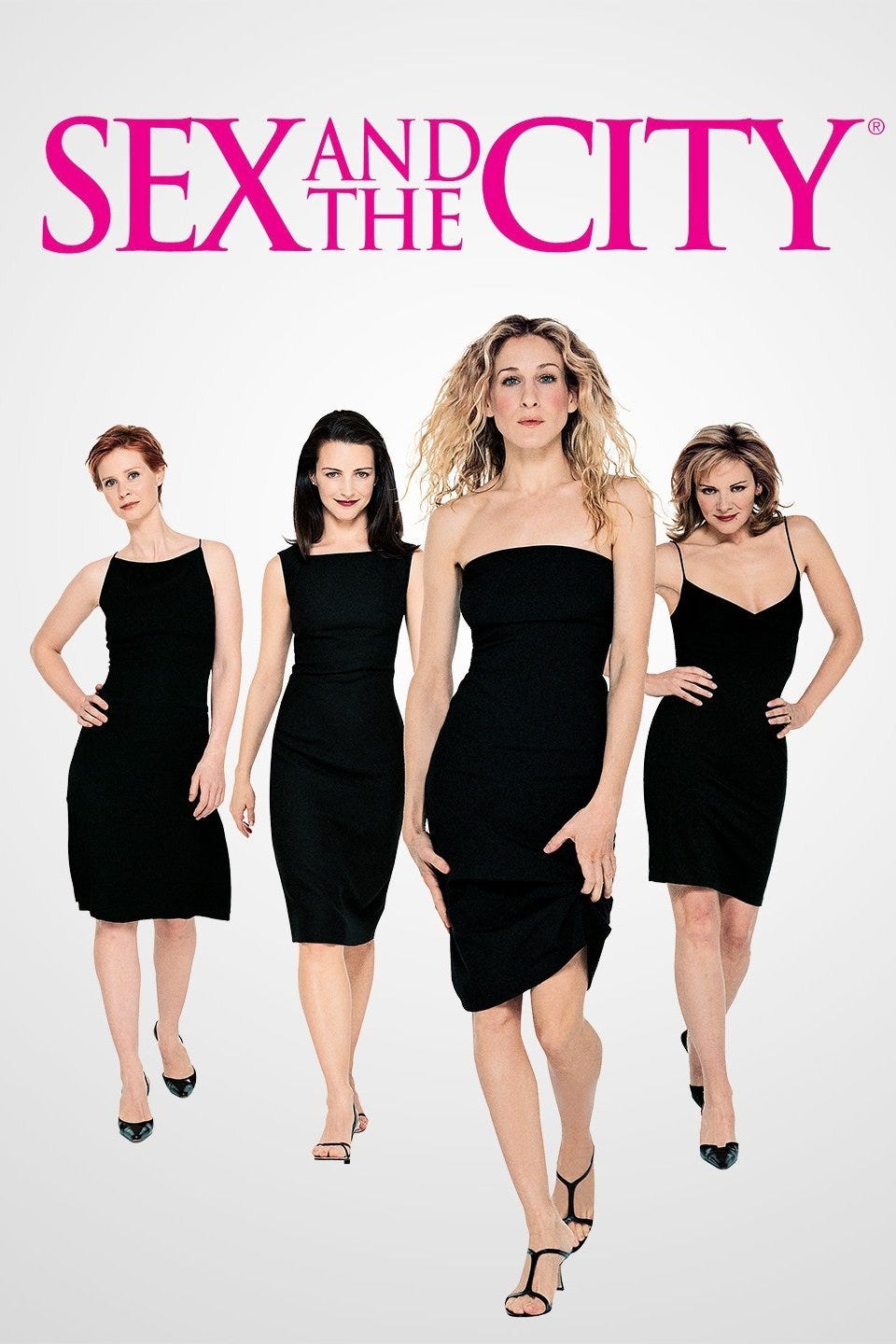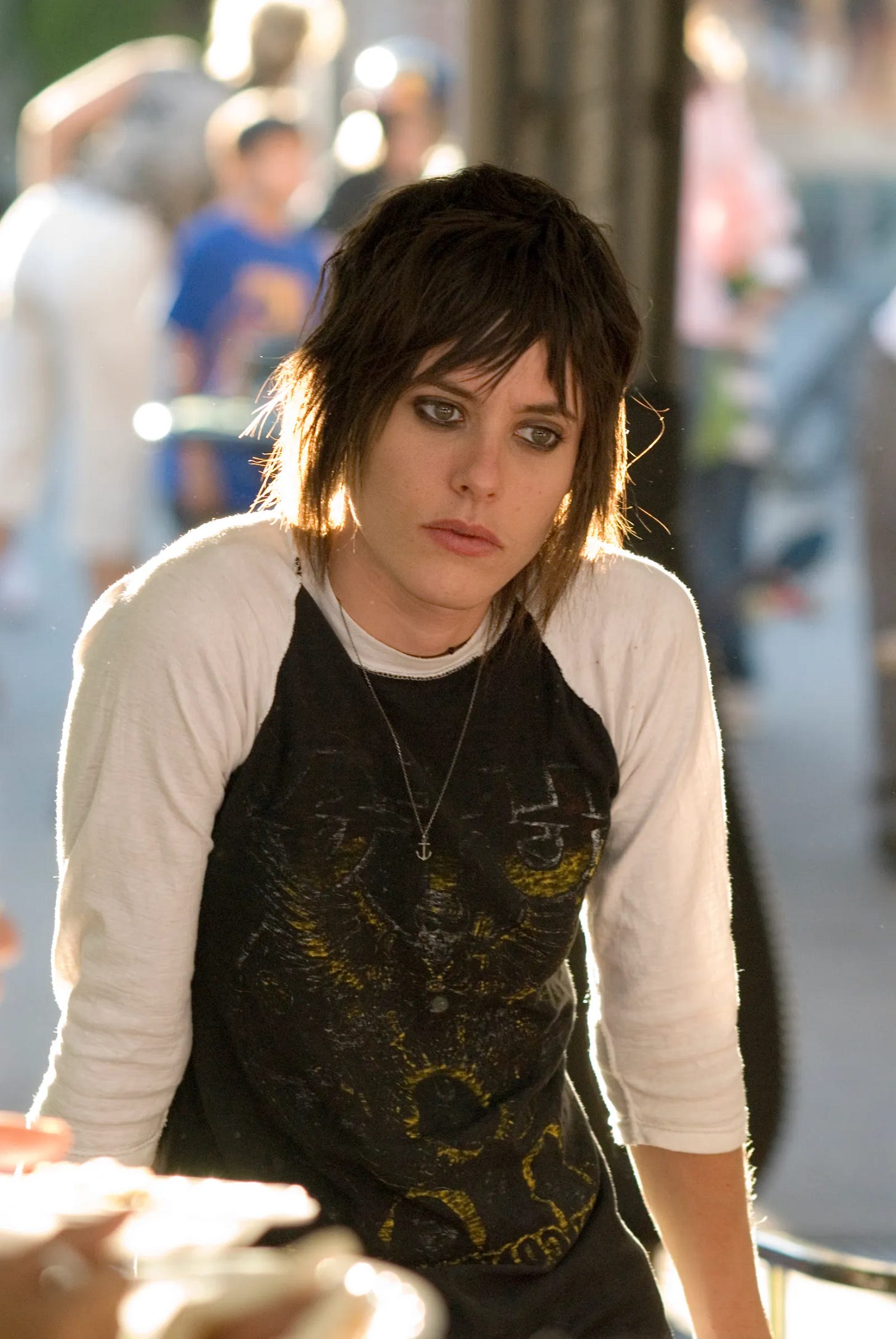Disclaimer: I <3 all my readers, but this article is intended for the girls, the gays, and sensitive straight men only, please!
On HBO Max, I’ve been watching Sex and The City1, the classic comedy-drama series that aired from 1998 to 2004. I didn’t expect to like it as much I as I do- it’s fun, sharp, witty, irreverent, and provides some much needed razzle-dazzle and escapism to an increasingly drab world. It’s also nice to find myself hyperfixated on something more mainstream and less “nerdy”, so that I finally have media I can chat about with my Mom and my sister.
By now, you probably know the plot: the show centers around Carrie Bradshaw (played by Sarah Jessica Parker), a relationship columnist living in the Upper East Side of Manhattan. She and her friends Charlotte (Kristin Davis), Miranda (Cynthia Nixon), and Samantha (Kim Cattrall) try to navigate love, work, womanhood, and- of course, sex.
Let me get something off my chest: the intro song is, unfortunately, not a bop. But besides that, I really don’t have anything negative to say about the series. My favorite part is that it’s a time capsule of an era before the cell phones, culture wars, and neuroticism of today took over. Its chic portrayal of late 90s-early 2000s NYC makes me feel nostalgic for a time I never experienced.

Although Sex and The City is a cult classic, it also has a sizable anti-fandom who make no secret about their hatred of the series. It’s not nearly as bad as the hatedom for Girls (another HBO show with a similar premise), though. I remember in the 2010s people hated Lena Dunham with the same intensity of Trump Derangement Syndrome, and took obviously satirical lines out of context to prove the show was somehow promoting both a racist “white feminist” agenda and proto-woke evil liberal propaganda. But I feel like the hate for Girls and SATC stem from the same source: people not understanding that the shows are meant to be tongue-in-cheek. A common complaint I hear is that Carrie Bradshaw and the gang are what a gay guy’s idea of women are like (the show’s creator, Darren Star, is a gay male, but many of the writers and producers are women). But I don’t understand how anyone can hear dialogue like “I am quitting my job to make my life better and do something worthwhile like have a baby and cure AIDS” and not realize that the show is hilariously self-aware and pure camp, hunny.
That being said, Sex and The City contains a lot more positive messages than people give it credit for. The portrayal of female friendships is a joy to watch and one of the highlights of the series for me. The ladies’ romantic relationships may come and go, but their bond with one another always stays in style. Yes, there’s plenty to criticize about the corporate Gen X feminism (which is sneeringly written off as “girlboss-ism”) that the show is centered around. However, I believe that this street-smart, old-school “Amazonian Feminism” is generally a good philosophy to center your life around: love being a woman, take no shit but also accept responsibility for yourself, reclaim your sexuality without being exploited by pimps and Johns (both the literal and metaphorical ones), and approach life’s challenges head-on with a healthy sense of humor and a can-do attitude. This post by Xitter user basic_chanel says it best:
Since I’ve been enjoying SATC so much, I looked for other female-centered shows to watch with a similar vibe. I watched the first two episodes of The L Word, a lesbionic take on the “raunchy slice-of-life series about women trying to make it in the city” genre.
And- I’m sorry- but even as (or maybe especially as) a Sister-In-Sappho, the show isn’t my cup of tea.
Firstly, the Los Angeles setting really isn’t my thing. Maybe it’s because I grew up on the East Coast, and can identify much more with SATC’s New York-ness in comparison. To be honest, I watch TV to escape from the looming Californication of the world, not embrace it.
Secondly, I want to make it clear that I’m not one of those people who goes through media with a red pen, penalizing it for not being “diverse enough” and not taking in consideration the entirety of the human experience. Still, for one of the most famous LGBT shows ever made, the portrayal of the lesbian community just seems so far removed and artificial from anything resembling real life. Compared to Dykes To Watch Out For, which emphasizes how there’s no one way to be gay, it seems like this show has the message that “girls can like girls, but only if they embody a Kardashian-like hyperfemininity.”
Shane is lowkey mother, and quickly became one of my favorite characters. I can imagine she was the Gay Awakening for many girls in the Early Aughts. But I can’t believe that this was the most butch a lesbian character was allowed to be in the 2000s without Scaring the Hoes:2
Sex and The City’s Miranda, with her pixie cut, 1980s power suits and tell-it-like-it-is attitude, is ironically a lot more gender non-conforming than any lesbian character in The L Word. Fun fact: the character of Miranda may be straight, but her actress is married to a woman in real life.

To clarify, this isn’t me bashing feminine women. I’m pretty femme myself. I love dresses- they’re nice and cool, which is perfect for the hot Florida weather. Growing up, I chose books over sports and Hello Kitty over Teenage Mutant Ninja Turtles. Physical labor has never been my strongsuit (whatever God’s plan is for me, it does NOT involve changing a tire or moving a stove, that’s for damn sure). But the marketing for the show seemed to be about how it’s “better” or more cutting-edge than lesbian media in the past because the cast lives up to a certain expectation of femininity.
Finally, what I’ve seen from The L Word is that it’s so damn serious. Yes, Sex and The City also focuses on affluent, upper-class yuppies who have a flair for the dramatic. But the most glaring difference is that it’s actually fun. Meanwhile, the tone of what I’ve seen of The L Word just feels unnecessary somber.
To end this on a positive note, there’s a French-Canadian series called Féminin/Féminin that’s also a look in the everyday life of lesbians, and it seems a lot less commercialized than The L Word. I’ll probably check it out and might review it as part 2 of Lemon’s TV Corner for Ladies.
For the Mandela Effect crowd- yes, it’s Sex AND The City, not “In”.
The phrase “Scaring the Hoes” isn’t misogynistic, since the aforementioned “hoes” refers to the onlooking audience regardless of gender, the eternal panopticon, who have had their feelings and/or preconceived notions significantly rattled. In this essay I will….








1) I can't believe you called me "hunny" in the middle of your article (spelled with a "u"!) Extremely upsetting.
2) Have you seen Buffy the Vampire Slayer? I go back and forth on whether it's really a "feminist" tv show and would be interested in your thoughts.
I was the 10th person to love this.